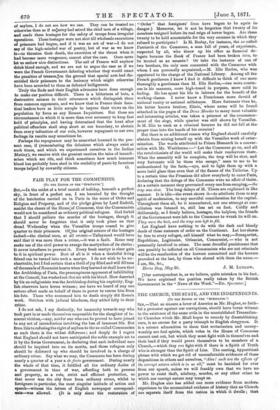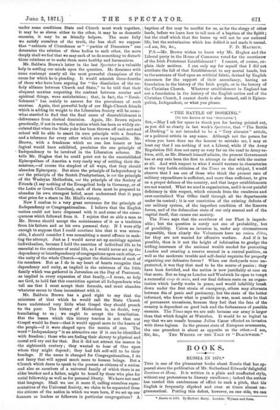THE CHURCH, THE STATE, AND THE INDEPENDENTS...
[TOTHE EDITOR OF THE "SPECTATOR:1
Sin,—That so sincere a lover of America as Mr. Hughes, so faith- ful a protester against our corruptions, should have borne witness- to the existence of the same evils in the unestablished Transatlan- tic Churches which Mr. Miall hopes to remedy by disestablishing. ours, is no excuse for a party triumph to English clergymen. It- is a solemn admonition to them that sectarianism and money– worship are foul spirits, which votes in the House of Commons- cannot cast out, but which they must fight with in themselves and. their land if they would prove themselves to be members of a. Church,—which they can fight with if there is a Spirit of Truth. who is stronger than the Spirit of Lies. The canting, hypocritical. phrase with which we get rid of uncomfortable evidences of these- dispositions in others and ourselves, "Alas such are the effects of the corrupt nature which is in us all," must be banished for ever from our speech, unless we will frankly own that we have no. power to resist theft, adultery, murder, or any other crime to. which our corrupt nature may tempt us.
Mr. Hughes also has added one more evidence from modern, experience to the accumulated evidence of history that no Church. can separate itself from the nation in which it dwells ; that.
under some conditions State and Church must work together, it may be as slaves either to the other, it may be as domestic -enemies, it may be as friendly helpers. The more fully we satisfy ourselves of the truth, the less shall we suppose that "cabinets of Churchmen or" "parties of Dissenters" can determine the relation of these bodies to each other, the more -deeply shall we feel that we may each of us do something to disturb those relations or to make them more healthy and harmonious.
Mr. Baldwin Brown's letter in the last Spectator is a valuable -help in settling our minds upon the question. He dismisses with some contempt nearly all the most powerful champions of the -cause for which he is pleading. It would astonish three-fourths -of those who have been arguing for "the dissolution of the un- holy alliance between Church and State," to be told that their -eloquent maxims respecting the contrast between secular and :spiritual things, were antichriatian ; that, in fact, the "Estab- lishment" has mainly to answer for the prevalence of such -maxims. Again, that powerful body of our High-Church friends "which is adding its weight to the Liberation Society will be some- .what startled to find that the final cause of disestablishment is deliverance from clerical dominion. Again, Mr. Brown rejects practically, if not in words, the notion which has been so widely cir- -ciliated that when the State yoke has been thrown off each sect and school will be able to assert its own principle with a freedom -and a tolerance for every other which are now impossible. Mr. d3rown, with a frankness which no one less honest or less !logical would have exhibited, proclaims the one principle of • ffndependency to be involved in the Liberation scheme. He tells Mr. Hughes that he could point out to the unestablished Episcopalians of America a very ready way of settling their dis- sensions,—of course the simplest of all ways, that they should -abandon Episcopacy. But since the principle of Independency is mot the principle of the Scotch Presbyterians, is not the principle -of the Wealeyan Methodists, not the principle of the Society of Friends (I say nothing of the Evangelical body in Germany, or of the Latin or Greek Churches), each of them must be prepared to abandon its own strongest belief, must understand that it pays that price for a share in Mr. Miall's victory.
Now I confess to a very great reverence for the principle of independency or Congregationalism. I believe that the English :nation could not have dispensed with it and some of the conse- quences which followed from it. I rejoice that so able a man as Mr. Brown should accept the maintenance of it as a tradition from his fathers and as his own personal duty. If I were silly -enough to suppose that I could convince him that it was unten- able, I should consider I was committing a moral offence in mak- ing the attempt. Just as I would never set up sociology against individualism, because I hold the assertion of individual life to be -essential to the existence of social life, so I would never set up the -dependency or interdependency of congregations upon each other,— 'the unity of the whole Church—against the distinctness of each of its members. But as I do in my heart of hearts recognize that -dependency and unity, as implied in the existence of the little family which was gathered in Jerusalem on the Day of Pentecost, 4t13 implied in every expansion of that family,—I mean, so help en God, to hold fast this conviction against all Independents who tell me that I must accept their formula, and must abandon -whatever seems to them inconsistent with it.
Mr. Baldwin Brown has a good right to say that the :ministers of that which he would call the State Church have understood very little what Gospel they should preach to the poor. The history of Methodism is, no doubt, very humiliating to us ; we ought to accept the humiliation. But the lesson which this history teaches is not that our 'Gospel would be freer—that it would appeal more to the hearts of the people—if it were shaped upon the maxim of ,one. The "word " Independency " is an attractive one if it can be identified -with freedom ; those who are feeling their slavery to physical and moral evil cry out for that. But it did not attract the masses in the eighteenth century ; they wanted to hear of One upon whom they might depend ; they had felt self-will to be their bondage. If the name is changed for Congregationalism, I do not fancy that will appeal much more to human beings. But a Church which dares to speak to the poorest as citizens of a nation -and also as members of a universal family of which there is an elder brother and a father, might be heard by those who pine for social fellowship as well as for personal liberty. We have not used that language. Shall we use it more if, calling ourselves repre- sentatives of the Universal Society, we claim to be separated from the citizens of the nation in which we were born, if we set up our banners as leaders or followers in particular congregations? A baptism of fire may be needful for us, as for the clergy of other lands, before we learn how to tell men of a baptism of the Spirit ; but the chaff which that fire burns up will not be our national life, but the sectarianism which has defiled it and made it unreal.
P.S.—Mr. Brown wishes to know why Mr. Hughes and the Liberal party in the House of Commons voted for the overthrow of the Irish Protestant Establishment? I cannot, of course, ex- plain their motives. I can only say for myself that I did not attribute the fall of that Establishment to any mortal hands, but to the sentence of God upon an artificial fabric, devised by English statesmen for the support of their ascendancy, having no foundation in the history of the Irish people, or in the history of the Christian Church. Whatever establishment in England has not a foundation in the history of the English nation and of the Christian Church, I cannot doubt is also doomed, call it Episco- palian, Independent, or what you please.



































 Previous page
Previous page